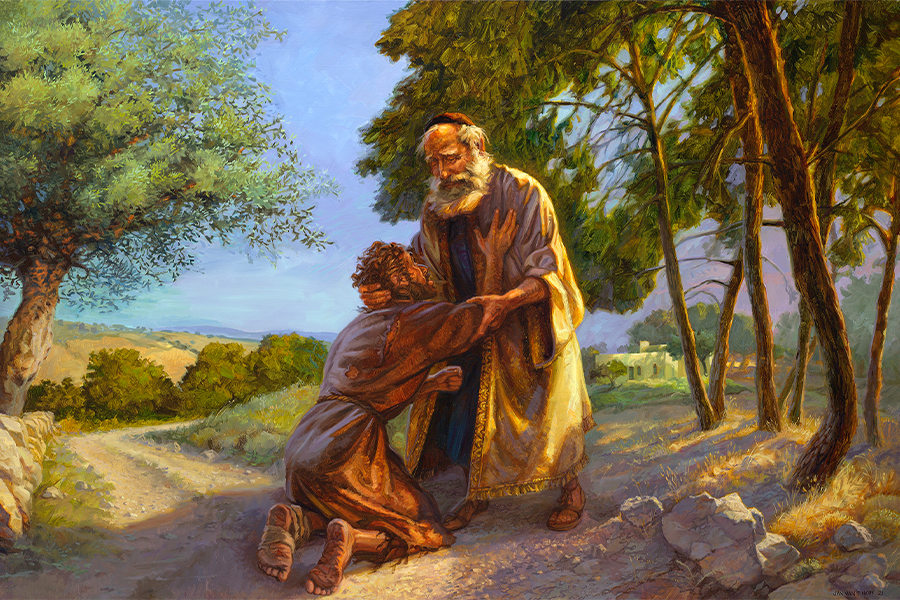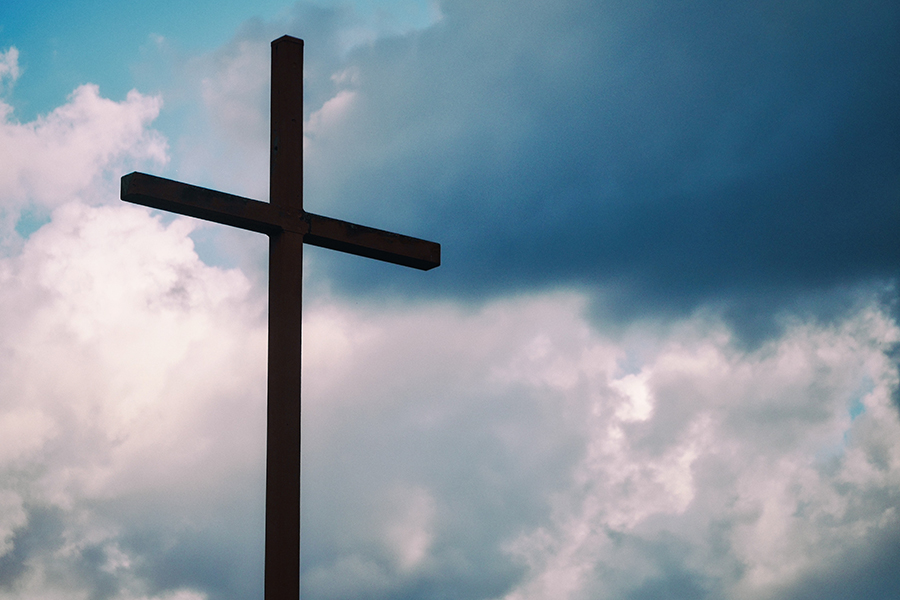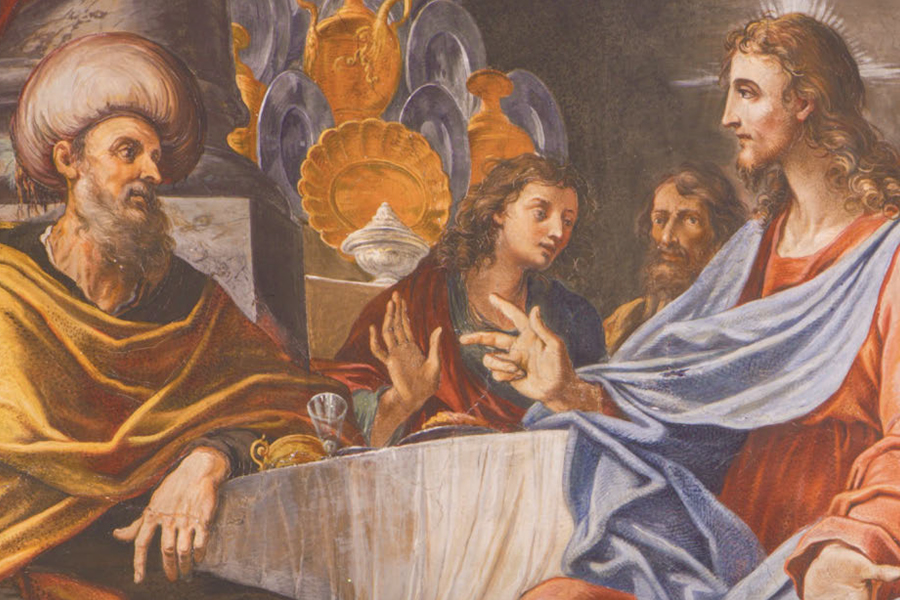St. Francis of Assisi Weekly Reflections

How do you respond to the “Lazarus” in your life?
09-25-2022Weekly ReflectionWe Celebrate Worship Resource, Vol. 47, No. 3We can all fall prey to selective blindness: a purposeful disregard of something we’d rather not see. The more comfortable our own lives are, the easier it becomes to ignore unpleasant things. Witness the rich man in the Gospel. With his nice home, fine wardrobe, and sumptuous meals, he preferred to ignore poor Lazarus outside his door. During their time on earth the rich man’s front gate was as great a divide as the chasm between heaven and hell was later. He was willfully blind to the plight of Lazarus, his brother in the covenant of Abraham. Now he can see clearly, but it’s too late. Amos, in the first reading is even more critical of the well-off among the Israelites, complacent in their luxury while the kingdom of Northern Israel teeter on the edge of collapse. From Amos’s time to Jesus’ to ours, people often become selectively blind to other people’s problems. At the end of Jesus’ story, Abraham says that Lazarus' brothers will not change even “if someone should rise from the dead” (Luke 16:31). But now someone has. Will we change?
Who is someone you have overlooked whom you realize now you should respond to with Christ’s love and compassion?
¿Cómo Responsdes al “Lázaro” en tu Vida?
Todos podemos ser víctimas de la ceguera selectiva: una indiferencia deliberada hacia algo que preferiríamos no ver. Cuanto más cómodas son nuestras propias vidas, más fácil se vuelve ignorar las cosas desagradables. Testimonio del hombre rico en el Evangelio. Con su bonita casa, su fino guardarropa y sus suntuosas comidas, prefería ignorar al pobre Lázaro al otro lado de su puerta. Durante su tiempo en la tierra, la puerta de entrada del hombre rico era una división tan grande como lo fue más tarde el abismo entre el cielo y el infierno. Estaba intencionalmente ciego a la difícil situación de Lázaro, su hermano en el pacto de Abraham. Ahora puede ver claramente, pero es demasiado tarde. Amos, en la primera lectura, es aún más crítico con los ricos entre los israelitas, satisfechos con su lujo mientras el reino del norte de Israel se tambalea al borde del colapso. Desde la época de Amós hasta la de Jesús y la nuestra, las personas a menudo se vuelven selectivamente ciegas a los problemas de otras personas. Al final de la historia de Jesús, Abraham dice que los hermanos de Lázaro no cambiarán aunque “alguien resucite de entre los muertos” (Lucas 16:31). Pero ahora alguien ha resucitado. ¿Entonces cambiaremos nosotros?
¿Quién es alguien a quien has pasado por alto y ahora te das cuenta de que debes responder con el amor y la compasión de Cristo?
The Rich and the Poor
09-25-2022Question of the WeekReading I: Amos 6:1a, 4-7 - Third woe
Reading II: 1 Timothy 6:11-16 - The good fight of faith
Gospel: Luke 16:19-31 - The rich man and Lazarus
Key Passage: There was a rich man and at his gate lay a poor man named Lazarus, covered with sores, who longed to satisfy his hunger with what fell from the rich man's table. (Luke 16:19–21)
Adults: What are the "rewards" of caring for the needs of the poor?
Kids: What is one thing you and your family could do this week to help those who are poor or sick?
Los Ricos y Los Pobres
Lectura I: Amós 6:1a, 4-7 - Tercer ay
Lectura II: 1 Timoteo 6,11-16 - La buena batalla de la fe Evangelio: Lucas 16,19-31 - El rico y Lázaro
Pasaje Clave: Había un hombre rico y a su puerta yacía un hombre pobre llamado Lázaro, cubierto de llagas, que deseaba saciar su hambre con lo que caía de la mesa del rico. (Lucas 16:19–21)
Adultos: ¿Cuáles son las "recompensas" de atender las necesidades de los pobres?
Niños: ¿Qué es lo que tú y tu familia podrían hacer esta semana para ayudar a los pobres o enfermos?

You cannot serve both God and mammon
09-18-2022Weekly ReflectionWe Celebrate Worship Resource, Vol. 47, No. 3When Jesus begins a parable with a rich man, we expect that the parable will end with this man getting his just deserts. Not this time. (Wait until next week.) In this parable, both the rich man and the scheming steward come off pretty well. Why would Jesus tell his disciples a parable like this? Perhaps sneaking a peek at the end of the Gospel will give us a clue. “You cannot serve both God and mammon” (Luke 16:13). You cannot devote yourself to both spiritual wealth and material wealth. Both the rich man and the scheming steward devote themselves to material wealth and are able to take a financial setback and turn it around in their favor. Perhaps Jesus wants his disciples to take the cleverness of the steward’s scheme but apply it to building spiritual wealth (“true wealth” [16:11]) rather than material wealth. After all, all our wealth—our talents, our possessions, our world—ultimately comes from God. We are mere stewards of that wealth.
How can you be a “child of light,” a prudent steward of the spiritual gifts you received?
No pueden ustedes servir a Dios y al dinero
Cuando Jesús comienza una parábola con un hombre rico, esperamos que la parábola termine con este hombre recibiendo su merecido. No esta vez. (Espere hasta la próxima semana). En esta parábola, tanto el hombre rico como el mayordomo intrigante salen bastante bien. ¿Por qué Jesús les diría a sus discípulos una parábola como esta? Quizás echar un vistazo al final del Evangelio nos dé una pista. “No pueden ustedes servir a Dios y al dinero” (Lucas 16:13). No puedes dedicarte tanto a la riqueza espiritual como a la riqueza material. Tanto el hombre rico como el mayordomo intrigante se dedican a la riqueza material y son capaces de tomar un revés financiero y cambiarlo a su favor. Quizás Jesús quiere que sus discípulos tomen la astucia del esquema del mayordomo pero la apliquen a construir riqueza espiritual (“bienes verdaderos” [16:11]) en lugar de riqueza material. Después de todo, toda nuestra riqueza, nuestros talentos, nuestras posesiones, nuestro mundo, en última instancia proviene de Dios. Somos meros administradores de esa riqueza.
¿Cómo puedes ser un “hijo de la luz”, un mayordomo prudente de los dones espirituales que recibiste?
The Value of Honesty
09-18-2022Question of the WeekReading I: Amos 8:4-7 - Against greed
Reading II: 1 Timothy 2:1-8 - Conduct of men and women
Gospel: Luke 16:1-13 or 16:10-13 - The dishonest steward
Key Passage: Whoever is faithful with very little can also be trusted with much; and whoever is dishonest with very little is dishonest also in much. (Luke 16:10)
Adults: Can cheating and deception ever be justified?
Kids: If someone treats you unfairly, do you have the right to
do the same to them?
El Valor de la Honistidad
Lectura I: Amós 8:4-7 - Contra la codicia
Lectura II: 1 Timoteo 2:1-8 - Conducta de hombres y mujeres
Evangelio: Lucas 16:1-13 o 16:10-13 - El mayordomo deshonesto
Pasaje Clave: El que es fiel en lo poco, también es fiel en lo mucho; y el que es deshonesto en lo poco, también es deshonesto en lo mucho. (Lucas 16:10)
Adultos: ¿Se pueden justificar las trampas y los engaños?
Niños: Si alguien te trata injustamente, ¿tienes derecho a hacerle lo mismo?

All are Sought, All are Rescued and Brought Back to the Fold
09-11-2022Weekly ReflectionWe Celebrate Worship Resource, Vol. 47, No. 3Moses had spent forty days on Mount Sinai, a length of time associated with trial and testing, but it is the Chosen People who have been tested, and they have failed. In Jesus’ parable, a single sheep wanders off, failing to stay with the herd. The shepherd responds to the sheep just as the Lord responded to the Chosen People (after Moses’ eloquent plea): with love and forgiveness for all those in his care. The Chosen People, who committed sacrilege in Moses’ absence; Saint Paul, who admits he was “a blasphemer and a persecutor” (1 Timothy 1:13); the wayward sheep, who wandered away; the prodigal son, who forsook his father; all are sought out, all are rescued, all are brought back to the fold. No matter how lost we are or how sinful we are, God will forgive us, welcoming us back and rejoicing in our return. Recall that the parable Jesus tells today are his response to the compliant that he “welcomes sinners and eats with them” (Luke 15:2). Here we are today, sinners all, welcomed to eat at the table of the Lord.
Whom do you need to seek out and forgive?
Todos son buscados, Todos son Rescatados y Devueltos al Redil
Moisés había pasado cuarenta días en el Monte Sinaí, un período de tiempo asociado con pruebas, pero es el Pueblo Elegido el que ha sido probado y ha fallado. En la parábola de Jesús, una sola oveja se desvía y no se queda con el rebaño. El pastor responde a las ovejas como el Señor respondió al Pueblo Elegido (después de la elocuente súplica de Moisés): con amor y perdón para todos los que están bajo su cuidado. El Pueblo Elegido, que cometió sacrilegio en ausencia de Moisés; san Pablo, que se reconoce así mismo como “blasfemo y perseguidor” (1 Timoteo 1:13); la oveja descarriada, que se desvió; el hijo pródigo, que abandonó a su padre; todos son buscados, todos son rescatados, todos son devueltos al redil. No importa cuán perdidos estemos o cuán pecadores seamos, Dios nos perdonará, nos dará la bienvenida y se regocijará en nuestro regreso. Recordemos que la parábola que Jesús cuenta hoy es su respuesta al cumplido de que “recibe a los pecadores y come con ellos” (Lucas 15:2). Aquí estamos hoy, pecadores todos, bienvenidos a comer en la mesa del Señor.
¿A quién necesitas buscar y perdonar?
The Courage to Forgive
09-11-2022Question of the WeekReading I: Exodus 32:7-11, 13-14 - The golden calf
Reading II: 1 Timothy 1:12-17 - Paul's gratitude
Gospel: Luke 15:1-32 or 15:1-10 - The prodigal son
Key Passage: The servant replied, “Your brother has come, and your father has killed the fatted calf, because he has got him back safe and sound.” Then he became angry and refused to go in. His father came out and began to plead with him. (Luke 15:27–28)
Adults: When have you persistently sought after a member of your family who has lost his or her way?
Kids: Have you ever felt you were not getting credit for your good works? What did you do?
El Valor de Perdonar
Lectura I: Éxodo 32, 7-11, 13-14 - El becerro de oro
Lectura II: 1 Timoteo 1,12-17 - La gratitud de Pablo
Evangelio: Lucas 15,1-32 o 15,1-10 - El hijo pródigo
Pasaje Clave: Este le contestó: ‘Tu hermano ha regresado, y tu padre mandó matar el becerro gordo, por haberlo recobrado sano y salvo.” El hermando mayor se enojó y no quería entrar. Salió entonces el padre y le rogó que entrara. (Lucas 15:27–28)
Adultos: ¿Cuándo ha buscado persistentemente a un miembro de su familia que se ha perdido?
Niños: ¿Alguna vez has sentido que no estabas recibiendo crédito por tus buenas obras? ¿Qué hiciste?

Are You Ready to Carry Your Cross?
09-04-2022Weekly ReflectionWe Celebrate Worship Resource, Vol. 47, No. 3Today’s Gospel is a difficult one. Hate your family. Give up all your belongings. Carry your own cross. Who would want to be a disciple? Is this what Jesus really wants us to do? The decision to make all these painful sacrifices seems outrageous. But then, “Who can know God’s counsel, or who can conceive what the Lord intends?” (Wisdom 9:13). Over two thousand years later, God’s will is no less inscrutable. Jesus demands we leave our families and carry our crosses, but at another point he says his burden is light and from the cross he asks his beloved disciple and his mother to care for each other. Perhaps the lesson here is that choosing to be a disciple is a transformational decision, a decision to live a whole different kind of life. His disciples were willing to leave their homes, their families, their jobs, their belongings—their entire lives—because their new lives were now all they desired. Discipleship doesn’t demand that you sacrifice what you want as much as it changes what you want.
Can you recall being so consumed by something that nothing else mattered?
¿Estas Listo para Cargar tu Cruz?
El evangelio de hoy es difícil. Odia a tu familia. Renuncia a todas tus pertenencias. Lleva tu propia cruz. ¿Quién querría ser un discípulo? ¿Es esto lo que Jesús realmente quiere que hagamos? La decisión de hacer todos estos sacrificios dolorosos parece indignante. Pero luego, “¿Quién puede conocer el consejo de Dios, o quién puede concebir lo que el Señor pretende?” (Sabiduría 9:13). Más de dos mil años después, la voluntad de Dios no es menos inescrutable. Jesús exige que dejemos a nuestras familias y carguemos nuestras cruces, pero en otro punto dice que su carga es ligera y desde la cruz le pide a su amado discípulo y a su madre que se cuiden mutuamente. Quizás la lección aquí es que elegir ser un discípulo es una decisión transformadora, una decisión de vivir un tipo de vida completamente diferente. Sus discípulos estaban dispuestos a abandonar sus hogares, sus familias, sus trabajos, su pertenencia—su vida entera—porque sus nuevas vidas eran ahora todo lo que deseaban. El discipulado no exige que sacrifique lo que desea tanto como cambie lo que desea.
¿Puedes recordar haber sido tan consumido por algo que nada más era importante?
Discerning God's Will
09-04-2022Question of the WeekReading I: Wisdom 9:13-18b - Solomon's prayer
Reading II: Philemon 9-10, 12-17 - Plea for Onesimus
Gospel: Luke 14:25-33 - Sayings on discipleship
Key Passage: For who can learn the counsel of God? Or who can discern what the Lord wills? For the reasoning of mortals is worthless, and our designs are likely to fail. (Wisdom 9:13–14)
Adults: How do you try to discover what God is asking of you?
Kids: When is it hard for you to know the right thing to do? Who helps you know?
Discernir la Voluntad de Dios
Lectura I: Sabiduría 9: 13-18b - Oración de Salomón
Lectura II: Filemón 9-10, 12-17-Suplica por Onésimo
Evangelio: Lucas 14: 25-33 - Dichos sobre el discipulado
Pasaje Clave: ¿Quién es el hombre que puede conocer los designios de Dios? ¿Quién es el que puede saber lo que el Señor tiene dispuesto? Los pensamientos de los mortales son inseguros y sus razonamientos pueden equivocarse. (Sabiduría 9: 13–14)
Adultos: ¿Cómo tratas de descubrir lo que Dios te está pidiendo?
Niños: ¿Cuándo es difícil para ti saber lo correcto? ¿Quién te ayuda a saber?
Seeking Humility
08-28-2022Question of the WeekReading I: Sirach 3:17-18, 20, 28-29 - Humility
Reading II: Hebrews 12:18-19, 22-24a - God the judge; Jesus the mediator
Gospel: Luke 14:1, 7-14 - A lesson in humility
Key Passage: Jesus said, “But when you give a banquet, invite the poor, the crippled, the lame, and the blind. And you will be blessed, because they cannot repay you, for you will be repaid at the resurrection of the righteous.” (Luke 14:13–14)
Adults: Has the hunger for status and influence in the world around you endangered your life as a Christian?
Kids: Does it make you a better person to be chosen first for a team or some other honor? Why or why not?
Buscando la Humildad
Lectura I: Eclesiástico 3, 17-18, 20, 28-29 - Humildad
Lectura II: Hebreos 12:18-19, 22-24a - Dios el juez; Jesús el mediador
Evangelio: Lucas 14, 1, 7-14 - Una lección de humildad
Pasaje Clave: Jesús dijo: “Al contrario, cuando des un banquete, invita a los pobres, a los lisiados, a los cojos y a los ciegos; y serás dichoso, porque ellos no tienen con qué pagarte, pero ya se te pagara, cuando resuciten los justos”. (Lucas 14:13–14)
Adultos: ¿El hambre del estatus e influencia en el mundo que te rodea ha puesto en peligro tu vida como cristiano?
Niños: ¿Te hace una mejor persona ser elegido primero para un equipo o algún otro honor? ¿Por qué o por qué no?

The Poor are Welcomed and the Humble are Exalted
08-28-2022Weekly ReflectionWe Celebrate Worship Resource, Vol. 47, No. 3Seeing guests gravitate toward a place of honor in the home of prominent Pharisee, Jesus preaches humility, pointing out that at a wedding banquet it’s far better to be promoted to a better seat in front of your peers that to be demoted to the back of the room. It’s sound advice, to be sure, but remember this is a parable. As in other parables, the “wedding banquet” is God’s kingdom, the feast to which we are all invited, but one in which God’s grace, not our own sense of self-importance, determines our placement. God will elevate the humble. Then Jesus directs his attention to the host, reproving him for inviting only pompous people who trip over each other to get good seats. Instead, invite to your feast those who can’t reciprocate—the hungry, the poor, those who do not even have a home. This parallels his account of the last judgment, when the king welcomes those who gave food to the hungry and drink to the thirsty, since in doing so they were doing it for Christ. The ultimate feast is in the kingdom of God, where the poor are welcomed and the humble are exalted.
How can you approach God with humility? How can you or your parish invite those who cannot repay you?
Los Pobres son Acogidos y los Humildes son Exaltados
Al ver a los invitados gravitar hacia un lugar de honor en la casa de un fariseo prominente, Jesús predica la humildad, señalando que en un banquete de bodas es mucho mejor ser promovido a un mejor asiento frente a tus compañeros que ser degradado a la parte posterior de la habitación. Es un buen consejo, sin duda, pero recuerda que esto es una parábola. Como en otra parábola, el “banquete de bodas” es el reino de Dios, la fiesta a la que todos estamos invitados, pero en la que la gracia de Dios, no nuestro propio sentido de importancia personal, determina nuestra ubicación. Dios elevará a los humildes. Entonces Jesús dirige su atención al anfitrión, reprochándolo por invitar solo a personas pomposas que tropiezan entre sí para conseguir buenos asientos. En cambio, invite a su fiesta a aquellos que no pueden corresponder: los hambrientos, los pobres, los que ni siquiera tienen un hogar. Esto es paralelo a su relato del juicio final, cuando el rey da la bienvenida a los que dieron de comer a los hambrientos y de beber a los sedientos, ya que al hacerlo lo hacían por Cristo. La fiesta suprema está en el reino de Dios, donde los pobres son acogidos y los humildes son exaltados.
¿Cómo puedes acercarte a Dios con humildad? ¿Cómo puedes tu o tu parroquia invitar a aquellos que no pueden reciprocar?

Strive to Enter through the Narrow Door
08-21-2022Weekly ReflectionWe Celebrate Worship Resource, Vol. 47, No. 3t’s easy to become complacent when things are going well. If we have the fortune of good health, a decent job, a loving family, and a comfortable life, we tend to relax and presume all will be well. But Jesus warns us in the Gospel that while some who were last will be first, some who are first will be last. Our material success in this world will not unlock the door to the next. To enter through the narrow door, the words of Hebrews may help. Discipline (from Latin disciplina, meaning “teaching”...the same root as for “disciple”), which the Lord gives out of love, is painful when it is applied but it brings joy in the end. Above all, however, it is divine mercy that unlocks the door. Jesus tells us that God’s mercy admits those “from the east and the west and from the north and the south” (Luke 13:29), echoing Isaiah, who names places in Africa, Asia, and Europe as the origins of those streaming into the new Jerusalem. May God’s wide mercy rescue us from our complacency and guide us through the narrow door!
How have you become complacent? What discipline can raise you out of it?
Esfuércense en Entrar por la Puerta Angosta
Es fácil volverse complaciente cuando las cosas van bien. Si tenemos la fortuna de una buena salud, un trabajo decente, una familia amorosa y una vida cómoda, tendemos a relajarnos y suponer que todo estará bien. Pero Jesús nos advierte en el Evangelio que mientras algunos que fueron últimos serán primeros, algunos que son primeros serán últimos. Nuestro éxito material en este mundo no abrirá la puerta al siguiente. Para entrar por la puerta angosta, las palabras de Hebreos pueden ayudar. La disciplina (del latín disciplina, que significa “enseñanza”...la misma raíz que “discípulo”), que el Señor da por amor, es dolorosa cuando se aplica pero al final trae alegría. Sin embargo, sobre todo es la misericordia divina la que abre la puerta. Jesús nos dice que la misericordia de Dios admite a los “del oriente y del poniente, del norte y del sur” (Lucas 13:29), haciéndose eco de Isaías, quien menciona lugares en África, Asia y Europa como los orígenes de los que fluyen hacia la nueva Jerusalén. ¡Que la amplia misericordia de Dios nos rescate de nuestra complacencia y nos guíe por la puerta estrecha!
¿Cómo te has vuelto complaciente? ¿Qué disciplina puede sacarte de ella?
The Narrow Door
08-21-2022Question of the WeekReading I: Isaiah 66:18-21 - Gathering of the nations
Reading II: Hebrews 12:5-7, 11-13 - The discipline of God
Gospel: Luke 13:22-30 - The narrow door Key Passage: Jesus answered them, “Strive to enter through the narrow door; for many, I tell you, will try to enter and will not be able.” (Luke 13:24)
Adults: What daily choices are you making that will allow you to be recognized at the doorway of the reign of God?
Kids: What good habits are you practicing in order to be a good Christian?
La Puerta Angosta
Lectura I: Isaías 66,18-21 - Reunión de las naciones
Lectura II: Hebreos 12:5-7, 11-13 - La disciplina de Dios
Evangelio: Lucas 13,22-30 - La puerta estrecha Pasaje Clave: Jesús les respondió: “Esfuércense por entrar por la puerta, que es angosta, pues yo les aseguro que muchos tratarán de entrar y no podrán.” (Lucas 13:24)
Adultos: ¿Qué elecciones diarias estás haciendo que te permitirán ser reconocido en la puerta del reino de Dios?
Niños: ¿Qué buenos hábitos estás practicando para ser un buen cristiano?

Don't Lose Heart
08-14-2022Weekly ReflectionWe Celebrate Worship Resource, Vol. 47, No. 3We like to visualize the Holy Spirit coming as a dove, a symbol of peace. But at Pentecost the Holy Spirit descended upon the Apostles as tongues of fire. Fire has a much different connotation, suggesting danger and destruction. This is the image Jesus used in today’s Gospel. He has begun his journey to Jerusalem, so heavy on his mind is the knowledge that he will face people with evil in their hearts, people who are willing to put that evil into action. Like Jeremiah in the first reading, Jesus has angered the political and religious authorities. At this point peace is not his goal. First, the evil in people’s hearts must be destroyed. When ignored, evil can flourish, spreading among those willing to look the other way, infecting an entire household or a whole community. Jesus would rather a family be divided than corrupted. The Holy Spirit, who comes to us in baptism, gives us the wisdom and fortitude to confront evil and the purifying fire to cauterize it before it spreads. May our Lord inspire us to do so, for “he endured such opposition from sinners, in order that (we) may not grow weary and lose heart” (Hebrews 12:3).
When have you felt prompted to stand up to evil? When have you done so and when have you failed to do so?
No Pierdas el Ánimo
Nos gusta visualizar al Espíritu Santo viniendo en forma de paloma, símbolo de paz. Pero en Pentecostés el Espíritu Santo descendió sobre los Apóstoles como lenguas de fuego. El fuego tiene una connotación muy diferente, sugiriendo peligro y destrucción. Esta es la imagen que usó Jesús en el Evangelio de hoy. Ha comenzado su viaje a Jerusalén, tan pesado en su mente es el conocimiento de que se enfrentará a personas con maldad en sus corazones, personas que están dispuestas a poner esa maldad en acción. Como Jeremías en la primera lectura, Jesús ha enojado a las autoridades políticas y religiosas. En este punto, la paz no es su objetivo. Primero, el mal en los corazones de las personas debe ser destruido. Cuando se ignora, el mal puede florecer, extendiéndose entre aquellos dispuestos a mirar hacia otro lado, infectando a toda una familia o a toda una comunidad. Jesús preferiría una familia dividida que corrompida. El Espíritu Santo, que viene a nosotros en el bautismo, nos da la sabiduría y la fortaleza para afrontar el mal y el fuego purificador para cauterizarlo antes de que se propague. Que nuestro Señor nos inspire a hacerlo, porque “sufrió tal contradicción de pecadores contra sí mismo, para que nuestro ánimo no se canse hasta desmayar” (Hebreos 12:3).
¿Cuándo te has sentido impulsado a hacer frente al mal? ¿Cuándo lo ha hecho y cuándo no lo ha hecho?
An Unsettling Truth
08-14-2022Question of the WeekReading I: Jeremiah 38:4-6, 8-10 - Jeremiah in the miry cistern
Reading II: Hebrews 12:1-4 - God's treatment of his sons and daughters
Gospel: Luke 12:49-53 - Jesus' mission of division
Key Passage: Jesus said, “Do you think that I have come to bring peace to the earth? No, I tell you, but rather division!” (Luke 12:51)
Adults: When has your taking a strong stand on a moral issue created division rather than healing in the short term?
Kids: Is it important to do the right thing even if others are angry as a result? Why or why not?
Una Verdad Inquietante
Lectura I: Jeremías 38:4-6, 8-10 - Jeremías en la cisterna cenagosa
Lectura II: Hebreos 12:1-4 - El trato de Dios a sus hijos e hijas
Evangelio: Lucas 12, 49-53 - La misión de división de Jesús
Pasaje Clave: Jesús dijo: “¿Piensan acaso que he venido a traer paz a la tierra? De ningún modo. No he venido a traer la paz, sino división!” (Lucas 12:51)
Adultos: ¿Cuándo el hecho de tomar una posición firme sobre un tema moral ha creado división en lugar de sanación a corto plazo?
Niños: ¿Es importante hacer lo correcto incluso si los demás están enojados como resultado? ¿Por qué o por qué no?
Running the Race of Faith
08-07-2022Question of the WeekReading I: Wisdom 18:6-9 - On the death of the Egyptian firstborn
Reading II: Hebrews 11:1-2, 8-19 - Faith of the ancients
Gospel: Luke 12:32-48 - We depend on God; prepare for the master's return
Key Passage: Therefore, since we are surrounded by such great a cloud of witnesses, let us also lay aside every weight and the sin that clings so closely, and let us run with perseverance the race that is set before us, looking to Jesus the pioneer and perfecter of our faith. (Hebrews 12:1–2a)
Adults: Other than Jesus, which of the ancestors of Christian faith has served as the greatest example to you? Why?
Kids: Which person of the Bible has been a good example to you of how to live?
Corriendo la Larrera de la Fe
Lectura I: Sabiduría 18:6-9 -Sobre la muerte del primogénito egipcio
Lectura II: Hebreos 11:1-2, 8-19 -La fe de los antiguos
Evangelio: Lucas 12:32-48 - Dependemos de Dios; prepárate para el regreso del maestro
Pasaje Clave: Por tanto, nosotros, teniendo en derredor nuestro tan grande nube de testigos, despojémonos también de todo peso y del pecado que nos asedia, y corramos con perseverancia la carrera que tenemos por delante, puestos los ojos en Jesús el autor y consumador de nuestra fe.
(Hebreos 12:1–2a)
Adultos: ¿Además de Jesús, ¿cuál de los antepasados de la fe cristiana ha sido el mayor ejemplo para ti? ¿Por qué?
Niños: ¿Qué personaje de la Biblia ha sido un buen ejemplo para ti de cómo vivir?

How are you waiting for Jesus to arrive?
08-07-2022Weekly ReflectionWe Celebrate Worship Resource, Vol. 47, No. 3What are you waiting for?” We’ve certainly asked that question before and have probably directed it to others from time to time. The question, however, suggests passive waiting, not the kind of active waiting that is rewarded in Jesus’ parable today. The servants actively wait for their master’s return, girding their loins and lighting their lamps, for they are waiting in faith, expecting that he will come. The Chosen People waited in faith for their liberation, trusting in God while preparing their homes with the blood of the Passover lamb. Abraham and Sarah waited in faith for their promised descendants, trusting in God, who had enabled them to have a child in their old age. When Jesus, the master, returns to his faith-filled servants, he shares what he has brought from the feast, what he has received from the Father. For us, the irony is that our active waiting, our waiting in faith, is not just for an arrival far in the future. Jesus comes to us each and every day, often in ways we least expect: in the person in need, in grace from heaven, in the Eucharistic feast. We are called to be ever vigilant, for he is already here.
What can you do today to wait actively for Jesus’ arrival in your life?
¿Como Esperas la Llegada de Jesús?
¿Que estas esperando?" Ciertamente hemos hecho esa pregunta antes y probablemente la hemos dirigido a otros de vez en cuando. La pregunta, sin embargo, sugiere una espera pasiva, no el tipo de espera activa que se recompensa en la parábola de Jesús hoy. Los siervos esperan activamente el regreso de su amo, ceñiéndose los lomos y encendiendo sus lámparas, porque esperan con fe, esperando que él venga. El Pueblo Elegido esperó en la fe su liberación, confiando en Dios mientras preparaba sus hogares con la sangre del cordero pascual. Abraham y Sara esperaron con fe a la descendencia prometida, confiando en Dios, que les había permitido tener un hijo en su vejez. Cuando Jesús, el maestro, vuelve a sus siervos llenos de fe, comparte lo que ha traído de la fiesta, lo que ha recibido del Padre. Para nosotros, la ironía es que nuestra espera activa, nuestra espera en la fe, no es solo para una llegada en el futuro lejano. Jesús viene a nosotros todos los días, a menudo de la manera que menos esperamos: en la persona necesitada, en la gracia del cielo, en la fiesta eucarística. Estamos llamados a estar siempre alerta, porque él ya está aquí.
¿Qué puedes hacer hoy para esperar activamente la llegada de Jesús a tu vida?